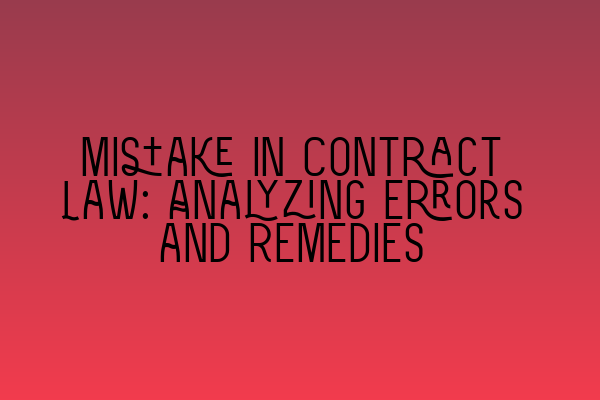Mistake in Contract Law: Analyzing Errors and Remedies
In the world of contract law, mistakes can happen. Whether it’s a simple clerical error or a more significant misunderstanding, these mistakes can have legal consequences. Understanding the concept of mistake and the available remedies is crucial for solicitors to provide effective legal counsel to their clients.
In this article, we will delve into the intricacies of mistakes in contract law and explore the various remedies available. We will analyze common types of mistakes, their impact on contract validity, and the potential consequences for all parties involved. So, let’s get started!
Types of Mistakes in Contract Law
When it comes to mistakes in contract law, there are two primary types: unilateral mistake and mutual mistake.
Unilateral Mistake
A unilateral mistake occurs when only one party makes an error in the contract. This mistake can arise from a typo or a misunderstanding of the terms. The key question in these cases is whether the party who made the mistake was negligent or acted in good faith.
In cases of unilateral mistake, the law generally favors the innocent party. However, there are situations where the mistaken party may be entitled to relief. For example, if the non-mistaken party knew or should have known about the mistake, it may be considered unfair to enforce the contract as is. In such cases, the court may allow the mistaken party to seek remedies.
It’s important to note that not all mistakes in contracts will invalidate the agreement. Minor errors, such as typographical mistakes or obvious clerical errors, may be overlooked by the court. However, more significant mistakes that affect the fundamental terms of the contract can render it void or voidable.
Mutual Mistake
Unlike unilateral mistake, mutual mistake occurs when both parties to the contract make the same error. This type of mistake can often render the contract void, as it lacks the necessary meeting of the minds. When both parties are mistaken, it indicates a fundamental failure to understand the terms and intentions of the contract.
In cases of mutual mistake, the court will typically declare the contract void ab initio, meaning it is treated as if it never existed. The parties are released from their obligations, and any consideration exchanged must be returned. This approach ensures fairness between both parties and protects them from entering into an agreement based on an erroneous understanding.
Remedies for Mistakes in Contract Law
When a mistake is established in a contract, there are several possible remedies that can be sought.
Rescission
Rescission involves the cancellation of the contract. It returns both parties to their pre-contractual positions by undoing the agreement. This remedy is commonly sought in cases of mutual mistake, where the contract is deemed void.
However, rescission may also be available for unilateral mistakes in certain circumstances. If the mistake is substantial and the non-mistaken party has not incurred any detriment, the court may grant rescission. It essentially allows the mistaken party to step away from the contract and avoid any potential negative consequences.
Rectification
Rectification is another remedy available for mistakes in contract law. Unlike rescission, rectification aims to correct the mistake rather than cancel the contract. It allows the court to rewrite the contract to reflect the true intentions of the parties involved.
This remedy is typically employed in cases where the mistake is due to a drafting error or a miscommunication between the parties. Rectification ensures that the contract aligns with the parties’ true intentions and prevents injustice or undue detriment resulting from an unintended error.
Damages
In some cases, damages may be awarded to the party who suffered harm as a result of the mistake. Damages aim to compensate for any losses incurred and restore the party to the position they would have been in if the mistake had not occurred.
However, the availability of damages for mistakes in contract law can vary depending on the nature and impact of the mistake. Unilateral mistakes, particularly when the non-mistaken party did not know about the error, may limit the possibility of recovering damages. On the other hand, mutual mistakes generally make it easier to claim damages, as the mistake affects both parties equally.
Conclusion
Mistakes in contract law can have significant legal implications. Whether it’s a unilateral mistake or a mutual mistake, understanding the types of mistakes and the available remedies is crucial for solicitors to navigate these complexities effectively. Rescission, rectification, and damages are the primary remedies that can be sought depending on the circumstances.
As solicitors, it is our responsibility to guide clients through the intricacies of contract law and provide expert advice on how to address mistakes. By applying a comprehensive understanding of mistake doctrine, we can effectively protect our clients’ interests and ensure a fair and just resolution.
To learn more about the legal challenges and pitfalls in your practice, navigate through our related article on Navigating Legal Challenges and Pitfalls in Your Practice. For a comprehensive comparison between barristers and solicitors, check out our article on Barrister vs. Solicitor: A Comprehensive Comparison. And if you’re interested in exploring different solicitor specializations and finding your niche, we have an article dedicated to that as well – Exploring Different Solicitor Specializations: Finding Your Niche.
If you’re considering a career in law and want to find the best law schools in the UK, check out our recommendations in this article – Top Recommendations for Law Schools in the UK. And finally, if you’re interested in the rise of virtual law practices and how they can benefit your legal career, read our article on Embracing the Rise of Virtual Law Practices.
